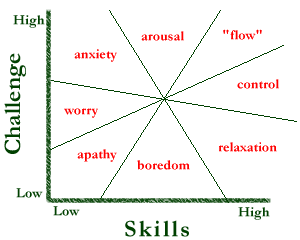This is a post that Annette Mees, one of my fellow co-directors in Coney, asked of me towards the upcoming pilot of Art Heist.
Flow Theory was reverse-engineered by Cziksentmihalyi from the question 'what are you doing now and how happy are you doing it'.
If you picture a graph with the challenge presented by your activity along one axis and the skills you have to meet that challenge against the other axis, then the sweet spot of flow is where the challenge slightly exceeds your skills, but where you can stretch yourself (or if you go via Vygotsky, stretch yourself with peers) to meet that challenge.
Aside: when you are in flow, there's often reported a sense of losing track of time.
On an Artist-Teacher Exchange Scheme at BAC, two educational psychologists recommended a teaching approach to give a group of kids a challenge, look to see if they are smiling in their eyes, if they are then they are in flow, leave them, if not, then adjust the difficulty of the challenge until they are.
Cziksentmihalyi shows an expansion of the array of emotions that are typically felt in the various imbalances of challenge and skill.
 So far, now this.
So far, now this.I think we can really usefully characterise as a challenge the experience of an audience from the conventions of a piece of art. They have varying skill for interpreting those conventions, contingent on their previous experience and understanding.
Challenge versus skill. Flowing around flow.
It's also a challenge to an audience to experience a story, which by continually provoking the implicit question 'what happens next' is challenging them to answer that in mind.
How perhaps the brilliant maxim of Improbable after Keith Johnstone - what we most want to happen next is what we didn't know we were expecting all along - is a reflection of being in the sweet spot of flow in the challenge of what happens next.
Look back at that graph of emotions. Think about yourself and the conventions of the art, story, music, play that you engage with in different circumstances and moods. And how you respond. That difficult play. The book you take for the beach. The game you play to unwind. Remember the last time you watched a film and time just flew by.
But your skill is not fixed. You learn, pretty quickly. A piece of work challenging with new conventions may be more widely appreciated if it itself helps its audience learn and master those new conventions as it unfolds.
-------------
Addendum.
Attribution theory. It's about how and where you attribute the cause of a situation/phenomenon. Crudely speaking, there's a difference between the default locus of attribution in being a participant and a spectator. A participant will tend to attribute to the situation. A footballer slips and misses a penalty and they'll blame the pitch. A spectator will tend to attribute personally: what a rubbish player. It's usually more complicated, but certainly you'd be a fool as a spectator to attribute personally based on one viewing only of that player.
Faced with art challenging beyond their experience, a conventional critic has to resist the temptation to attribute to the artist labels like wilful, self-indulgent etc. If they are to be a useful critic.
Addendum explaining (but not excusing) the existence of Christopher Hart at the Sunday Times.


